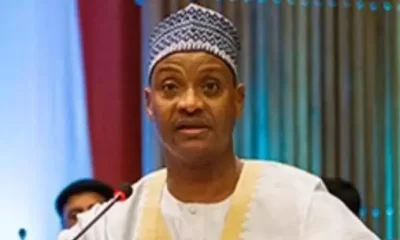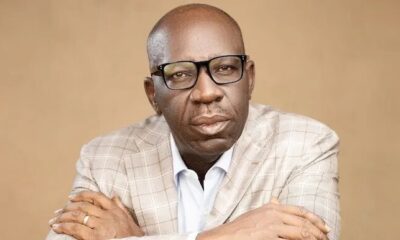Economic Issues
The Reality Behind Nigeria’s Debt Burden -By Sinclair Chinonso


A recently released data shows that Nigeria’s debt burden is now in excess of $55 billion !!
Now some might argue that the country has got enough buffer and cash flow to service that figure and more.
Some might also say that our net debt to GDP ratio is still very much low, and maybe other reasons but before u draw up any conclusions, let’s put a few things in their right perspective;
According to the just released NBS report, the Nigerian economy grew by 0.83% in 2017 following from a 1.58% contraction in 2016.
Before this time, actual GDP came down from a previous figure of $481.10 billion the preceding year to close at $405.1billion in 2016.
Now as a general rule, the acceptable maximum debt to GDP ratio for developing countries (for which Nigeria is one) is 40%. …and if we have to go with that figure, then 40% of $405.1 billion would compute as 40/100 x $405.1 = 0.4 x $405.1 = $162.04 billion.
…this is by far higher than the $55 billion which is presently our national debt burden. …and so some might argue that we still have enough room to borrow in excess of over $115 billion and until then, there’s no course for alarm.
Well am sorry to disappoint u. …bcos there’s actually a lot to worry about;
Using the figures above, our debt to GDP ratio would be $55/405.1 x 100%, which is approx 13.6%.
But even with a tax revenue in excess of N4 Trillion in 2017, Nigeria’s tax to GDP ratio currently stands at an average of 6% (according to data from pwc.) …this is one of the lowest in the world even amongst countries with the same and even lower socioeconomic parameters. …the likes of Ghana and Morocco have a tax to GDP ratio in excess of 21% while Zimbabwe, South Africa and Egypt to mention just a few have theirs at an above 30% average.
With a mega far less impressive 6% tax to GDP ratio, its clear that 2 things are playing out;
1) Most of the proceeds from the debt that Nigeria has so far raised have not been spent on Capital expenditure but on recurrent ones (what I call silly things that don’t generate any revenue).
and
2) Nigeria has not been generating well enough tax to deleverage its debt. …it’s clear from figures that we need to generate more than twice as much cash to help strike a balance on our net debt to GDP ratio, and thrice as much to put us in a better footing.
Frankly, I doubt if this government can sustainably (note the use of the word sustainably) grow the economy without improving on this indices. …especially given that we lack a diversified economic base.
We seriously need an aggressive but coherent model to expand on our income stream, a strong diversification in revenue drive and a higher spend on infrastructural development.
Part of the solution to tax return would probably depend on how effective the scheme VAIDS as lead by the ministry of finance thru FIRS and JTB would be, and if we can triple our cash receipts (…though I think this might be practically near impossible given the country’s history of policy flip ups).
Now this issue calls for some serious action. …otherwise we might keep borrowing to keep servicing our debt. …and the whole circle will continue until we probably hit the 40% stipulated maximum. …truth is, we don’t even have to hit the 40% suggested limit ’cause even a 20% debt burden could have a lot of negative impact on the economy given that we are just pulling off from the chains of a recession ‘whose shadow can still be felt around the economy’.
Unfortunately the many decision-making of this government particularly on the fiscal side is not helping the situation.
There are lots to say, but I can only pray and hope that things don’t get worse from here.
May God help us!!



















